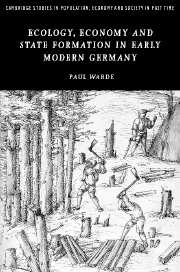Book contents
- Frontmatter
- Contents
- List of figures
- List of maps
- List of tables
- Acknowledgements
- Glossary
- List of abbreviations
- Introduction
- 1 The peasant dynamic
- 2 Power and property
- 3 The regulative drive
- 4 From clearance to crisis?
- 5 The two ecologies
- Conclusions
- Bibliography
- Index
- Cambridge Studies in Population, Economy and Society in Past Time
Introduction
Published online by Cambridge University Press: 24 July 2009
- Frontmatter
- Contents
- List of figures
- List of maps
- List of tables
- Acknowledgements
- Glossary
- List of abbreviations
- Introduction
- 1 The peasant dynamic
- 2 Power and property
- 3 The regulative drive
- 4 From clearance to crisis?
- 5 The two ecologies
- Conclusions
- Bibliography
- Index
- Cambridge Studies in Population, Economy and Society in Past Time
Summary
I will begin with two stories, stories that seem to provide contradictory accounts of the powers of the early modern state over the lives of its lowly subjects. Sometime in the late 1540s, a forest warden, a lowly paid official who was responsible for enforcing forest laws on the ground, was walking on patrol in an area of meadow in the wooded hills to the north-west of Stuttgart. ‘Young Hans’ was about thirty-five years old and had only recently begun what would be a long career as a warden. On the meadows he ran into his neighbouring warden, one Martin from Rutesheim. Hans commented that he hadn't seen Martin in a long while, and they agreed to go and have a drink of wine together, almost certainly the locally produced white wine, in the nearby village of Weilimdorf. On the way they ran into the swineherd of Weilimdorf with his pigs on the ‘wasted meadows’. The name was somewhat misleading, as the pasture there was in fact quite good owing to its open canopy and protected status. ‘Horstus Leckher’, Hans said to the swineherd, ‘I have forbidden you more than once’ to be taking his herd into the meadows. As he told the swineherd he would do, Hans went to the house of the ducal bailiff and village headman (Schultheiβ) of Weilimdorf to complain. The Schultheiβ, however, was not at home, and so Hans dropped the matter and we may presume went off for his drink with Martin.
- Type
- Chapter
- Information
- Publisher: Cambridge University PressPrint publication year: 2006

